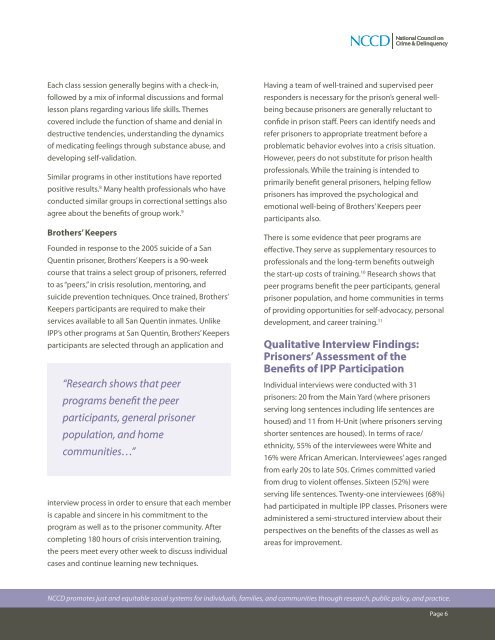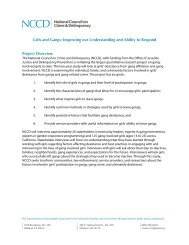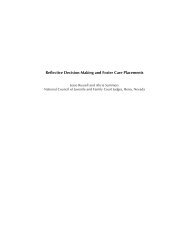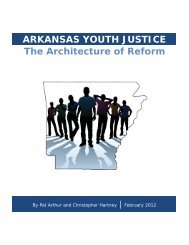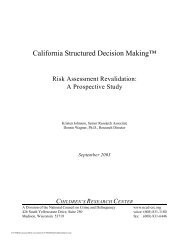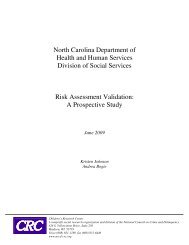Evaluation of the Insight Prison Project - National Council on Crime ...
Evaluation of the Insight Prison Project - National Council on Crime ...
Evaluation of the Insight Prison Project - National Council on Crime ...
Create successful ePaper yourself
Turn your PDF publications into a flip-book with our unique Google optimized e-Paper software.
Each class sessi<strong>on</strong> generally begins with a check-in,<br />
followed by a mix <str<strong>on</strong>g>of</str<strong>on</strong>g> informal discussi<strong>on</strong>s and formal<br />
less<strong>on</strong> plans regarding various life skills. Themes<br />
covered include <str<strong>on</strong>g>the</str<strong>on</strong>g> functi<strong>on</strong> <str<strong>on</strong>g>of</str<strong>on</strong>g> shame and denial in<br />
destructive tendencies, understanding <str<strong>on</strong>g>the</str<strong>on</strong>g> dynamics<br />
<str<strong>on</strong>g>of</str<strong>on</strong>g> medicating feelings through substance abuse, and<br />
developing self-validati<strong>on</strong>.<br />
Similar programs in o<str<strong>on</strong>g>the</str<strong>on</strong>g>r instituti<strong>on</strong>s have reported<br />
positive results. 8 Many health pr<str<strong>on</strong>g>of</str<strong>on</strong>g>essi<strong>on</strong>als who have<br />
c<strong>on</strong>ducted similar groups in correcti<strong>on</strong>al settings also<br />
agree about <str<strong>on</strong>g>the</str<strong>on</strong>g> benefits <str<strong>on</strong>g>of</str<strong>on</strong>g> group work. 9<br />
Bro<str<strong>on</strong>g>the</str<strong>on</strong>g>rs’ Keepers<br />
Founded in resp<strong>on</strong>se to <str<strong>on</strong>g>the</str<strong>on</strong>g> 2005 suicide <str<strong>on</strong>g>of</str<strong>on</strong>g> a San<br />
Quentin pris<strong>on</strong>er, Bro<str<strong>on</strong>g>the</str<strong>on</strong>g>rs’ Keepers is a 90-week<br />
course that trains a select group <str<strong>on</strong>g>of</str<strong>on</strong>g> pris<strong>on</strong>ers, referred<br />
to as “peers,” in crisis resoluti<strong>on</strong>, mentoring, and<br />
suicide preventi<strong>on</strong> techniques. Once trained, Bro<str<strong>on</strong>g>the</str<strong>on</strong>g>rs’<br />
Keepers participants are required to make <str<strong>on</strong>g>the</str<strong>on</strong>g>ir<br />
services available to all San Quentin inmates. Unlike<br />
IPP’s o<str<strong>on</strong>g>the</str<strong>on</strong>g>r programs at San Quentin, Bro<str<strong>on</strong>g>the</str<strong>on</strong>g>rs’ Keepers<br />
participants are selected through an applicati<strong>on</strong> and<br />
“Research shows that peer<br />
programs benefit <str<strong>on</strong>g>the</str<strong>on</strong>g> peer<br />
participants, general pris<strong>on</strong>er<br />
populati<strong>on</strong>, and home<br />
communities…”<br />
interview process in order to ensure that each member<br />
is capable and sincere in his commitment to <str<strong>on</strong>g>the</str<strong>on</strong>g><br />
program as well as to <str<strong>on</strong>g>the</str<strong>on</strong>g> pris<strong>on</strong>er community. After<br />
completing 180 hours <str<strong>on</strong>g>of</str<strong>on</strong>g> crisis interventi<strong>on</strong> training,<br />
<str<strong>on</strong>g>the</str<strong>on</strong>g> peers meet every o<str<strong>on</strong>g>the</str<strong>on</strong>g>r week to discuss individual<br />
cases and c<strong>on</strong>tinue learning new techniques.<br />
Having a team <str<strong>on</strong>g>of</str<strong>on</strong>g> well-trained and supervised peer<br />
resp<strong>on</strong>ders is necessary for <str<strong>on</strong>g>the</str<strong>on</strong>g> pris<strong>on</strong>’s general wellbeing<br />
because pris<strong>on</strong>ers are generally reluctant to<br />
c<strong>on</strong>fide in pris<strong>on</strong> staff. Peers can identify needs and<br />
refer pris<strong>on</strong>ers to appropriate treatment before a<br />
problematic behavior evolves into a crisis situati<strong>on</strong>.<br />
However, peers do not substitute for pris<strong>on</strong> health<br />
pr<str<strong>on</strong>g>of</str<strong>on</strong>g>essi<strong>on</strong>als. While <str<strong>on</strong>g>the</str<strong>on</strong>g> training is intended to<br />
primarily benefit general pris<strong>on</strong>ers, helping fellow<br />
pris<strong>on</strong>ers has improved <str<strong>on</strong>g>the</str<strong>on</strong>g> psychological and<br />
emoti<strong>on</strong>al well-being <str<strong>on</strong>g>of</str<strong>on</strong>g> Bro<str<strong>on</strong>g>the</str<strong>on</strong>g>rs’ Keepers peer<br />
participants also.<br />
There is some evidence that peer programs are<br />
effective. They serve as supplementary resources to<br />
pr<str<strong>on</strong>g>of</str<strong>on</strong>g>essi<strong>on</strong>als and <str<strong>on</strong>g>the</str<strong>on</strong>g> l<strong>on</strong>g-term benefits outweigh<br />
<str<strong>on</strong>g>the</str<strong>on</strong>g> start-up costs <str<strong>on</strong>g>of</str<strong>on</strong>g> training. 10 Research shows that<br />
peer programs benefit <str<strong>on</strong>g>the</str<strong>on</strong>g> peer participants, general<br />
pris<strong>on</strong>er populati<strong>on</strong>, and home communities in terms<br />
<str<strong>on</strong>g>of</str<strong>on</strong>g> providing opportunities for self-advocacy, pers<strong>on</strong>al<br />
development, and career training. 11<br />
Qualitative Interview Findings:<br />
<str<strong>on</strong>g>Pris<strong>on</strong></str<strong>on</strong>g>ers’ Assessment <str<strong>on</strong>g>of</str<strong>on</strong>g> <str<strong>on</strong>g>the</str<strong>on</strong>g><br />
Benefits <str<strong>on</strong>g>of</str<strong>on</strong>g> IPP Participati<strong>on</strong><br />
Individual interviews were c<strong>on</strong>ducted with 31<br />
pris<strong>on</strong>ers: 20 from <str<strong>on</strong>g>the</str<strong>on</strong>g> Main Yard (where pris<strong>on</strong>ers<br />
serving l<strong>on</strong>g sentences including life sentences are<br />
housed) and 11 from H-Unit (where pris<strong>on</strong>ers serving<br />
shorter sentences are housed). In terms <str<strong>on</strong>g>of</str<strong>on</strong>g> race/<br />
ethnicity, 55% <str<strong>on</strong>g>of</str<strong>on</strong>g> <str<strong>on</strong>g>the</str<strong>on</strong>g> interviewees were White and<br />
16% were African American. Interviewees’ ages ranged<br />
from early 20s to late 50s. <strong>Crime</strong>s committed varied<br />
from drug to violent <str<strong>on</strong>g>of</str<strong>on</strong>g>fenses. Sixteen (52%) were<br />
serving life sentences. Twenty-<strong>on</strong>e interviewees (68%)<br />
had participated in multiple IPP classes. <str<strong>on</strong>g>Pris<strong>on</strong></str<strong>on</strong>g>ers were<br />
administered a semi-structured interview about <str<strong>on</strong>g>the</str<strong>on</strong>g>ir<br />
perspectives <strong>on</strong> <str<strong>on</strong>g>the</str<strong>on</strong>g> benefits <str<strong>on</strong>g>of</str<strong>on</strong>g> <str<strong>on</strong>g>the</str<strong>on</strong>g> classes as well as<br />
areas for improvement.<br />
NCCD promotes just and equitable social systems for individuals, families, and communities through research, public policy, and practice.<br />
Page 6


